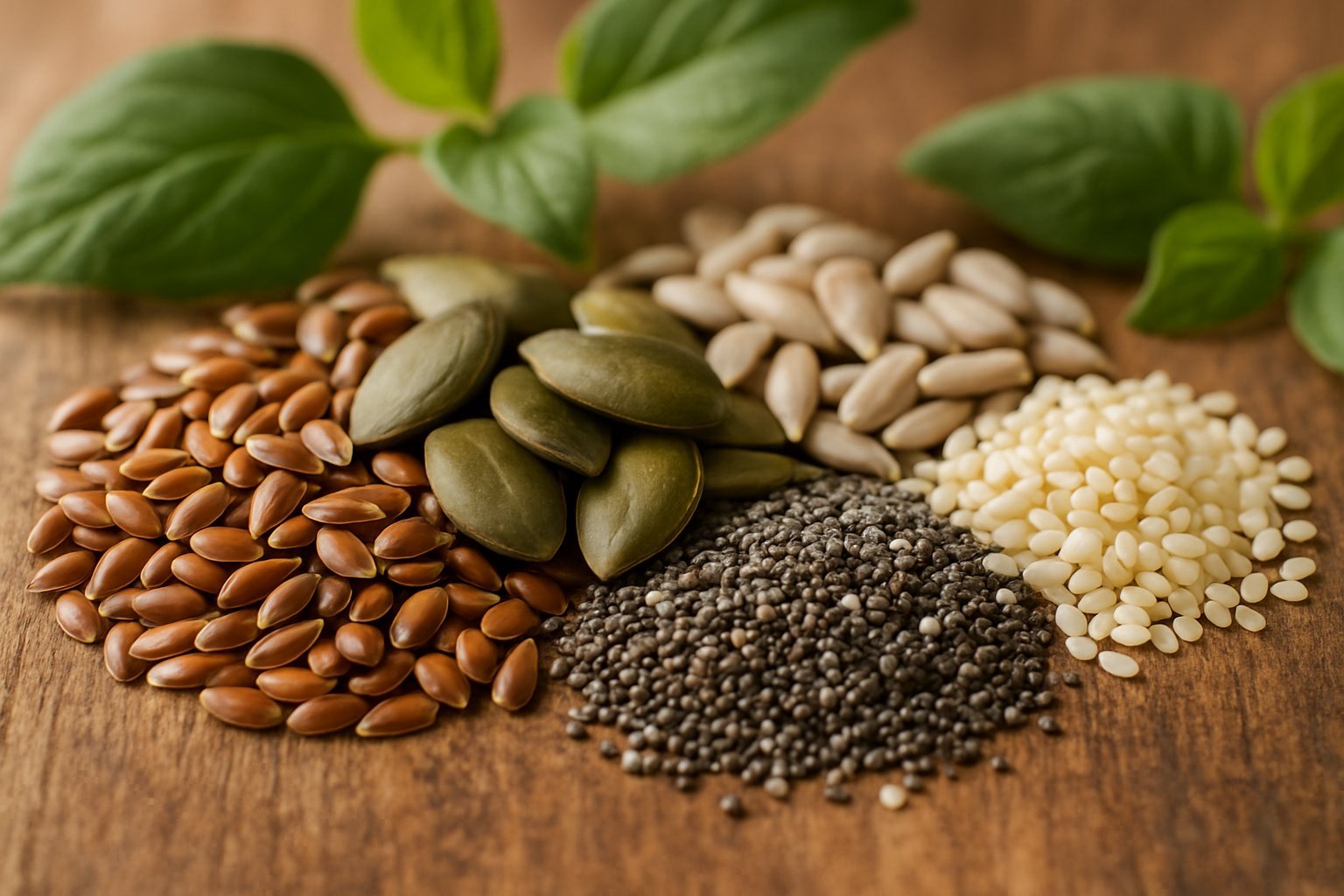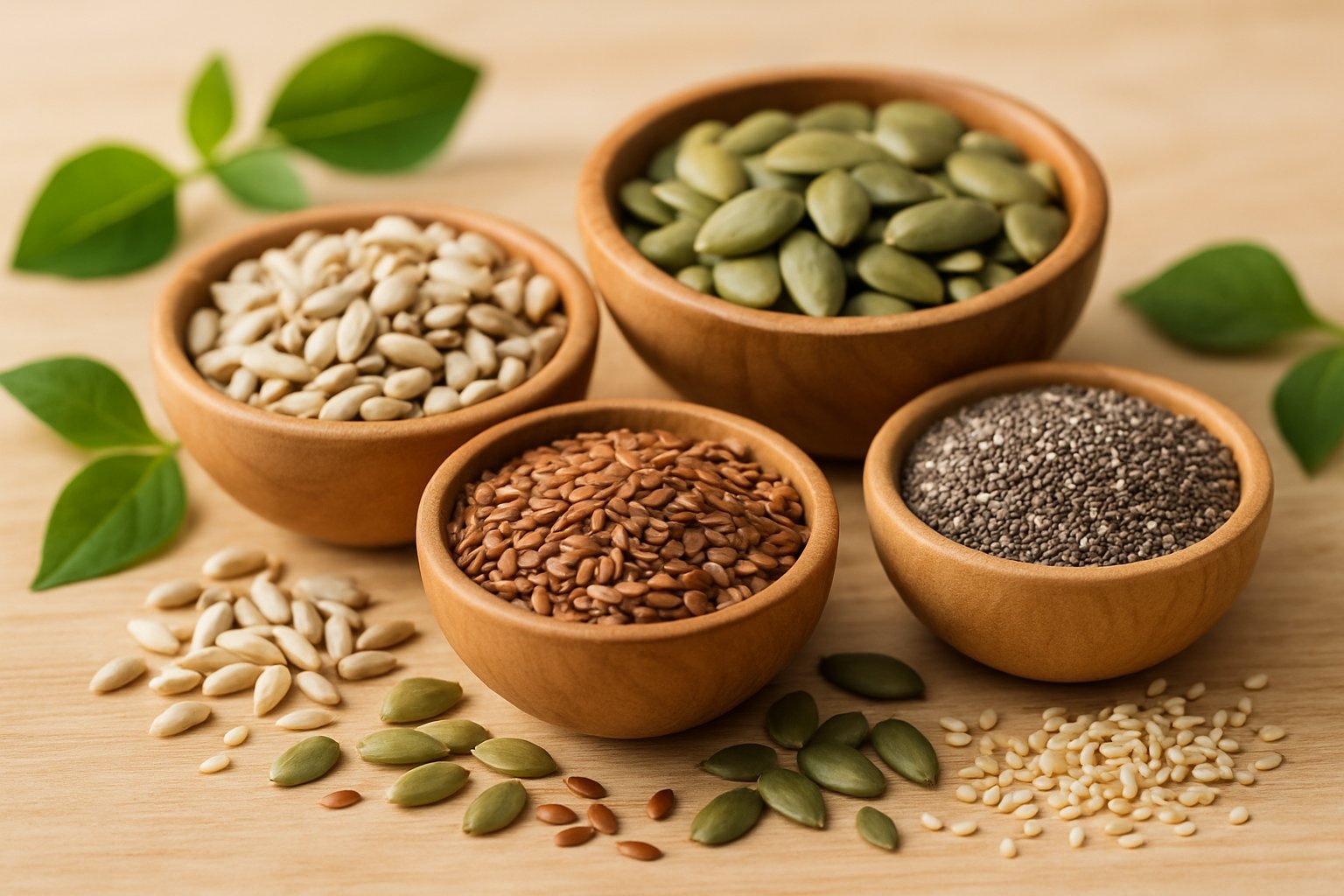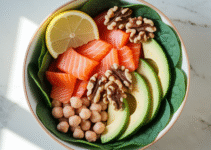Seeds can play an important role in supporting your fertility and reproductive health. By including certain seeds in your diet, you provide your body with essential nutrients that help regulate hormones and support ovulation.
The best seeds for female fertility are pumpkin, flax, sesame, and sunflower seeds. These seeds contain key vitamins, minerals, and healthy fats that promote balanced hormone levels and improved reproductive function.

These seeds are rich in zinc, lignans, omega fatty acids, and selenium. All of these contribute to hormone regulation and overall fertility.
Adding these seeds to your daily meals can be a simple way to support your body’s natural cycles. This may also improve your chances of conception.
Understanding how these seeds fit into your fertility diet helps you take control of your reproductive health. A nutrient-focused approach is natural and easy to include in your routine.
How Seeds Support Female Fertility

Seeds contain important nutrients that directly affect reproductive health. They provide healthy fats, fiber, antioxidants, and minerals.
These nutrients support hormone production and reduce inflammation. They also help regulate your menstrual cycle.
Nutritional Benefits for Reproductive Health
Seeds such as flax, pumpkin, sunflower, and chia are rich in nutrients essential for fertility. They supply healthy fats, especially omega-3 fatty acids, which reduce inflammation and improve egg quality.
These seeds offer fiber, which supports digestion and helps balance blood sugar. Stable blood sugar is important because it impacts hormone levels connected to fertility.
Seeds contain minerals like zinc, selenium, and copper. Zinc improves immune response and supports reproductive function.
Selenium helps produce new immune cells, and copper preserves your immune system. All of these contribute to a healthy reproductive environment.
Seeds and Hormonal Balance
Many seeds contain plant compounds called phytoestrogens. These have a similar structure to your body’s estrogen.
Flax and pumpkin seeds are high in lignans, a type of phytoestrogen that helps balance your hormone levels naturally. By supporting hormone production and function, these compounds can promote a healthier cycle and ovulation.
The healthy fats in seeds help your body make key reproductive hormones, such as estrogen and progesterone. Reducing inflammation with seeds’ omega-3 fatty acids also aids hormone balance.
Chronic inflammation can disrupt hormonal signaling and reduce fertility chances.
Role in Menstrual Cycle Regulation
Seeds can influence your menstrual cycle by supporting hormone levels through different phases. Some women use seed cycling, which involves eating specific seeds during the follicular and luteal phases to support estrogen and progesterone balance.
For example:
- Follicular phase: flax and pumpkin seeds help support rising estrogen levels.
- Luteal phase: sesame and sunflower seeds provide nutrients that support progesterone.
While seed cycling lacks strong scientific evidence, the vitamins and minerals in seeds contribute to a balanced cycle. Regular seed consumption ensures you get these benefits throughout your cycle.
Seed Cycling for Fertility
Seed cycling involves eating different seeds during specific parts of your menstrual cycle. This may help support hormonal balance, regulate your cycle, and improve ovulation and implantation.
Phases of the Menstrual Cycle
Your menstrual cycle has two main phases: the follicular phase and the luteal phase. The follicular phase starts on the first day of your period and lasts until ovulation.
During this phase, estrogen levels rise to prepare your body for ovulation. The luteal phase begins after ovulation and lasts until the start of your next period.
Here, progesterone increases to support a potential pregnancy. Balancing hormones in each phase is important for cycle regularity and fertility.
Seed Cycling Chart and How It Works
Seed cycling uses specific seeds during each phase to help balance your hormones naturally.
| Phase | Days | Seeds to Use |
|---|---|---|
| Follicular | Day 1-14 | Flax seeds and pumpkin seeds |
| Luteal | Day 15-28 | Sunflower seeds and sesame seeds |
During the follicular phase, flax and pumpkin seeds provide lignans and zinc. These help regulate estrogen and prepare for ovulation.
In the luteal phase, sunflower and sesame seeds supply selenium and omega-6 fatty acids. These support progesterone production and hormone balance.
You should grind seeds to improve digestion and nutrient absorption and soak them in water overnight to reduce harmful substances.
Getting Started with Seed Cycling
Begin seed cycling on the first day of your period. Calculate your period here. Take about 1 tablespoon of the recommended seeds daily, mixed with water or added to your meals.
Keep seeds fresh by grinding them in small batches and storing powder separately. Continue for at least one full menstrual cycle, typically 28 days, to monitor any changes in your cycle.
If you have allergies or health issues, consult a healthcare provider before starting. Consistency is important to help support hormonal balance, cycle regularity, and your fertility goals.
Top Seeds for Female Fertility
Certain seeds provide specific nutrients that support different parts of your fertility cycle. They can help balance hormones, improve egg health, and maintain a healthy uterine environment for pregnancy.
Flaxseeds: Hormone Modulation and Cycle Support
Flaxseeds are rich in lignans, a type of phytoestrogen. These compounds mimic estrogen in your body and can help regulate estrogen levels. Be careful though if you are already estrogen dominant, they really elevate your estrogen levels a lot and estrogen dominance can interfere with fertility.
The phytoestrogens in flaxseeds work gently, helping your body find hormone balance without overwhelming it. Including flax seeds in your diet can support hormone health.
Pumpkin Seeds: Ovulation and Egg Health
Pumpkin seeds are an excellent source of zinc, a mineral critical for ovulation. Zinc supports hormone production and helps maintain healthy egg development.
High zinc levels improve communication between cells and may boost your body’s response to reproductive hormones. This can lead to better ovulation timing and egg quality.
Eating pumpkin seeds regularly provides the zinc your body needs. This supports essential processes and strengthens your chances of natural conception.
Sunflower Seeds: Progesterone and Luteal Phase
Sunflower seeds are rich in vitamin E, a nutrient that supports progesterone production. Progesterone is vital during the luteal phase of your menstrual cycle, after ovulation.
Adequate progesterone helps prepare your uterine lining. This makes it easier for a fertilized egg to implant and grow.
Including sunflower seeds can assist in maintaining stable progesterone levels. This supports the later stages of your cycle and early pregnancy.
Sesame Seeds: Estrogen Regulation and Uterine Lining
Sesame seeds are high in calcium and iron, both essential for reproductive health. They also contain phytoestrogens that help regulate estrogen levels.
Balancing estrogen with sesame seeds can prevent estrogen dominance, which may disrupt your menstrual cycle and fertility. Calcium and iron contribute to strengthening your uterine lining.
Eating sesame seeds regularly supports hormonal balance and maintains a uterine environment that is conducive to conception.
Other Beneficial Seeds and Nuts
Certain seeds and nuts offer important nutrients that can support your fertility. They improve egg quality, hormone balance, and overall reproductive health.
Including these in your diet can provide omega-3 fatty acids, complete protein, and essential minerals that your body needs.
Chia Seeds: Omega-3s and Egg Quality
Chia seeds are an excellent plant-based source of omega-3 fatty acids, especially ALA (alpha-linolenic acid). Omega-3s help reduce inflammation and support better blood flow.
This is important for healthy egg development and implantation. Adding chia seeds to your diet ensures you get these healthy fats, especially if you follow a vegan or vegetarian lifestyle.
They also provide fiber, which supports gut health and helps your body absorb nutrients more efficiently. Chia seeds are easy to include in smoothies, yogurt, or oatmeal.
Just a tablespoon daily can help improve your egg quality by supporting cell structure and hormone balance.
Hemp Seeds: Complete Protein and Minerals
Hemp seeds contain all nine essential amino acids, making them a complete protein source. This is important for tissue repair and hormone production, both crucial for fertility.
They also provide magnesium, which plays a role in reducing stress and improving sleep. Magnesium supports muscle relaxation and healthy blood flow to reproductive organs. Find the best Magnesium supplements for fertility here.
By adding hemp seeds to your meals, you can boost your intake of these vital nutrients. Sprinkle them on salads or mix into cereals for an easy fertility-friendly boost.
Nuts for Fertility: Walnuts and Almonds
Walnuts and almonds offer key nutrients like folate, vitamin E, and healthy fats. Folate is important in early pregnancy and helps support healthy cell division and DNA synthesis.
Walnuts are rich in omega-3 fatty acids that promote egg quality and reduce inflammation. Almonds provide vitamin E, an antioxidant that protects reproductive cells from damage.
Including a small handful of these nuts daily can improve your nutrient balance. They make convenient snacks or a tasty addition to meals to support your fertility naturally.
7 Best Foods To Increase Fertility.
Nutrients in Seeds that Promote Fertility
Seeds provide key nutrients that support your fertility by helping hormone balance, egg health, and immune function. Important minerals, vitamins, antioxidants, healthy fats, fiber, and plant compounds work together to improve your reproductive system.
Zinc, Selenium, and Iron
Zinc plays a vital role in egg development and hormone production. Pumpkin seeds are a rich source of zinc, which supports faster conception and helps regulate your menstrual cycle.
Selenium helps produce new immune cells and protects your body from oxidative stress. Sunflower seeds provide a good amount of selenium, supporting your overall reproductive health.
Iron is essential for healthy blood flow and oxygen delivery to reproductive organs. Although seeds don’t contain as much iron as some other foods, adding them to your diet still contributes to your daily intake.
These minerals together help maintain the health of tissues involved in fertility.
Vitamin E and Other Antioxidants
Vitamin E supports implantation and may improve pregnancy rates in women facing unexplained infertility. Sunflower seeds are one of the best seed sources of vitamin E.
Antioxidants found in seeds protect your eggs and reproductive cells from damage caused by free radicals. This includes compounds like lignans, which have mild hormone-like effects.
These antioxidants also help reduce inflammation that may interfere with fertility. By eating a variety of seeds, you ensure your body receives a mix of antioxidants that work to support egg quality and a healthy uterine environment.
Fiber, Healthy Fats, and Phytoestrogens
Seeds are high in fiber, which supports gut health and helps regulate blood sugar. Stable blood sugar can reduce hormone imbalances that affect fertility.
Healthy fats, especially omega-3 fatty acids found in chia, flax, and hemp seeds, reduce inflammation and improve egg quality. Omega-3s are important because they help with hormone production and blood flow.
Phytoestrogens, plant compounds in flax and pumpkin seeds, mimic estrogen and may help balance your hormones. These lignans can decrease the time it takes to conceive by promoting a healthy hormone environment.
Including seeds regularly gives you a natural source of these nutrients. They work together to support female fertility.
Lifestyle Factors and Integrating Seeds into Your Fertility Plan
To support your fertility, focusing on more than just seeds is important. Combining seeds with a balanced diet and healthy habits can multiply benefits.
Managing stress and supporting hormone balance play key roles in improving your chances of conception.
Fertility-Friendly Meal Planning
Including seeds like flax, pumpkin, sesame, and sunflower in your meals adds essential nutrients like omega-3s, zinc, and vitamin E. These nutrients support egg quality, hormone balance, and immune function.
Try to add a tablespoon of mixed seeds daily to your salads, smoothies, or yogurt. Seeds are high in fiber, which helps regulate blood sugar and supports gut health.
Make sure your overall diet includes whole grains, lean proteins, fruits, and vegetables. Avoid processed foods high in sugar and unhealthy fats, as these can worsen inflammation and hormone issues linked to conditions like endometriosis.
How Diet Influences Your Menstrual Cycle.
Combining Seeds with Lifestyle Modifications
You should manage stress through relaxation techniques like meditation or yoga. High stress can disrupt your hormones and lower fertility.
Physical activity is important for your reproductive health. However, avoid excessive exercise, as it can cause hormonal imbalance and irregular periods.
Moderate exercise can help with mood swings and period pain. It also supports your overall well-being.
If you take fertility medications, maintaining a healthy lifestyle helps your body respond better. Seeds can provide natural support alongside your treatments, especially for hormonal support and reducing inflammation.
Sleep also affects fertility. Aim for 7-9 hours per night to help your body regulate hormones and support reproductive health.
When to Consult a Healthcare Provider
If you have ongoing issues like irregular cycles, severe PMS, endometriosis, or trouble conceiving, speak with your healthcare provider. Seeds can support fertility but are not a replacement for medical advice or treatment.
Discuss any use of seeds or supplements with your provider, especially if you are on fertility medications. Some seeds may interact with medications or affect hormone levels.
Your healthcare provider can test for hormonal imbalances and underlying conditions. They will help you build a safe and effective fertility plan tailored to your needs.
Frequently Asked Questions
Seeds like pumpkin, sunflower, chia, sesame, and flax each offer unique nutrients that can support your fertility. You can add them to your diet in different ways to help improve hormone balance, egg quality, and reproductive health.
What is the recommended way to incorporate pumpkin seeds into a diet for enhancing female fertility?
You can eat about one tablespoon of pumpkin seeds daily, either raw or roasted. Adding them to salads, smoothies, or snacks will provide zinc and lignans, which help support hormone balance and may improve your chances of conception.
Can sunflower seeds improve fertility in women and if so, how should they be consumed?
Sunflower seeds are rich in vitamin E, which supports implantation and pregnancy rates. Eating a tablespoon per day, sprinkled over meals or in seed butters, is a good way to include them in your diet.
What are the potential benefits of chia seeds for female reproductive health?
Chia seeds supply omega-3 fatty acids that help reduce inflammation and support egg health. You can add them to smoothies, porridge, or yogurt for an easy nutrient boost.
How might sesame seeds impact fertility and what is the suggested intake?
Sesame seeds provide copper, which helps maintain immune health and hormone function. A daily intake of about a tablespoon mixed into dressings or sprinkled on dishes can help support your fertility.
In what ways can flax seeds assist in conception for women?
Flax seeds contain lignans that act like plant estrogens, potentially helping to regulate hormones and shorten time to pregnancy. Try consuming a tablespoon of ground flax daily, especially during the first half of your menstrual cycle.
Are there any success stories involving seed cycling during pregnancy?
Many women have shared personal stories about improved menstrual cycle regularity and successful conception after trying seed cycling.
However, there is limited scientific evidence to support these claims. If you decide to try seed cycling, focus on including seeds consistently in your diet rather than worrying about perfect timing.

